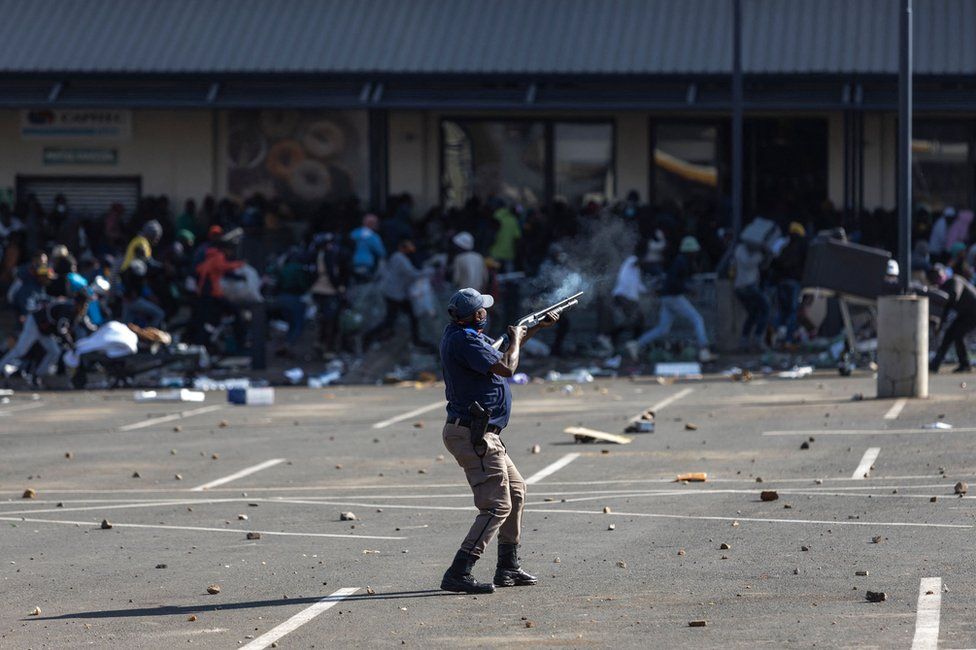The United Nations Children’s Fund (Unicef) has called on the South African government to put children and young people first in the country’s recovery out of unrest and the Covid-19 pandemic.
The organisation made the call ahead of the Nelson Mandela Day, following a week of unrest in the country resulting in the deaths of at least three children – a 15-year old boy a 14-year old boy and a 14-year old girl.
Christine Muhigana, Unicef South Africa representative said the organisation is devastated for the individuals, families and communities affected.
READ: Nzimande says the food prices following unrests will affect students
“We’ve also seen widely shared and shocking images of a two-year-old girl thrown from a building to be saved from a fire in Durban, with other social media content showing the participation of children in looting,” said Muhigana.
The riots came at a time when the country is battling a third Covid-19 wave. With schools already closed due to high infection rates, children are more at risk of being caught up in or involved in unrest, said Muhigana.
She added that the safeguarding of children from voluntary or encouraged involvement in the lawlessness is critical and that communities must come together to protect children.
“Law enforcement agencies also need to exercise restraint and protect children at every step of the way, in line with the Convention on the Rights of the Child and national legal instruments,” she said.
Muhugana said the unrest has also affected the country’s Covid-19 response.
“Some vaccination sites have temporarily closed, while health clinics have been damaged and medical stocks reportedly looted.
“Just as the Covid-19 vaccination roll-out had been gathering pace, statistics showed a drop in vaccinations in areas where the unrest was at its worst. This puts more lives at risk. Large crowds that are not practicing Covid-19 prevention measures could further fuel the spread of the virus,” said Muhigana.
READ: Education sector vaccination drive falls short
Routine child and family health services have also been disrupted.
According to Unicef the national routine immunisation coverage for children under one year is at 79%, already 4% below pre-Covid-19 rates and well under the 90% target.
Since schools closed, reports that many children who depend on the National Feeding Scheme did not receive food also circulated.
Education activists and school governing bodies have returned to the courts to fight for school meals for learners.
Equal Education and the school governing bodies (SGBs) of two Limpopo schools, represented by SECTION27 and the Equal Education Law Centre (EELC) said they are returning to court against the Department of Basic Education and provincial education departments for failing to rollout the National School Nutrition Programme to every single eligible learner in South Africa, for over a year.
This plight was further exacerbated by riots that saw more disruptions to food supplies.
According to Communication Specialist for Unicef South Africa Sudeshan Reddy the latest figures show that child hunger has not declined from the high rate of 14% and that three million children live in households affected by hunger.
“Screening for malnutrition in the early days and years of life, promoting breastfeeding and improving education on good nutrition can help but only when there is access to nutritious food for all,” said Reddy.
Unicef also called on the country’s government to prioritise the issue of youth unemployment.
According to UJ Professor and associate at the Centre for Social Development in Africa Lauren Graham, youth unemployment is one of South Africa’s most intractable challenges and has been made worse by the Covid-19 pandemic.
“Prior to the pandemic the unemployment rate, including people who had given up looking for work was just under 70% for people aged 15 to 24. A year later [in 2021] the rate had increased to 74.7%,” said Graham.
READ: Let them eat cake: hunger and food riots in South Africa
Graham added that young people on the continent are the most affected by unemployment and underemployment and they are struggling to survive.
“They are poor and are stuck in ‘waithood’ –a prolonged period of suspension in which people’s access to social adulthood is delayed or denied,” she said.
Unicef’s Muhigana said South Africa’s level of youth unemployment, at nearly 75%, is unsustainable.
“Initiatives such as Generation Unlimited, which brings together the private sector, academia, government, the United Nations and many others are working to provide young people with relevant 21st century skills, mentorship as well as supporting young entrepreneurs so some of the most vulnerable young people can transition into working lives,” she said.
Adding that it is child and youth-led actions that give expression to Madiba’s words that children are the “rock on which our future will be built, our greatest asset as a nation. They will be the leaders of our country, the creators of our national wealth who care for and protect our people”.
“As we move forward, we must give children every opportunity to do just that,” said Muhigana.










